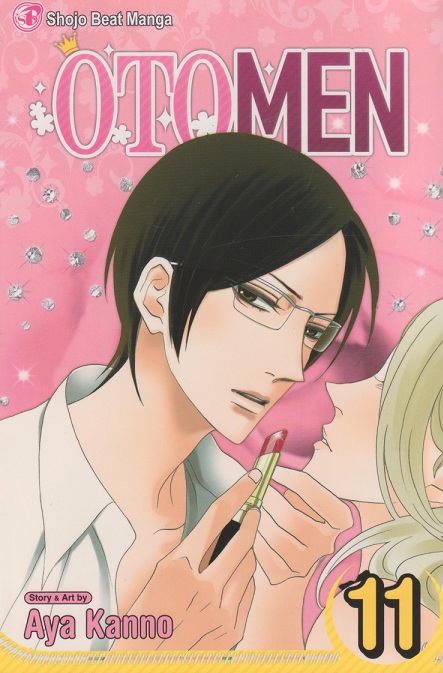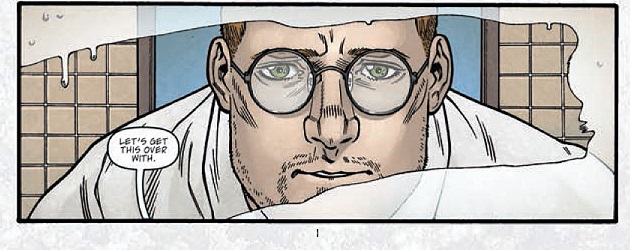 Title: Otomen
Title: Otomen
Author: Aya Kanno
Publisher: Viz Media (Shojo Beat)
Volume: Volume 11 (ongoing), $9.99
Vintage: 2010 by Hakusensha, August 2011 by Viz Media
Genre: Romantic comedy
The bizarre, Edo-theme field trip continues this volume. With a storm having blocked off the path back to civilization, knocked out the electricity and the phone lines, and all modern conveniences either completely absent or hidden away, these high school students are in a serious bind. They have no food, no power, no way to call for help, and no way to leave the far too realistic theme park. Kasuga is still hovering around, trying to make sure the men stay manly, and the girls stay girly. Unfortunately, faced with no food and no escape, history professor Mifune breaks down and is no help at all. Ryo offers to go scouring the forest for food, Kitora offers to go along to make sure she doesn’t pick anything poisonous, and Tonomine offers to go in place of Asuka to keep Ryo safe. This leaves Asuka behind to try and keep everyone calm and happy, so he and Juta decides to hold a festival to distract everyone. When Ryo and the others return, Asuka breaks out his otomen expertise to teach the other boys how to properly cook a meal with the foraged food. Seeing how hard Asuka works to make everyone around him happy, Mifune decides that the true spirit of a samurai is actually an otomen, and thus another of Kasuga’s secret weapons is converted to the otomen cause. Back at school, Asuka discovers a slip of paper inside his favorite book with a beautiful poem written on it. Moved by the mystery poet, Asuka writes a fan letter and slips it into the book, hoping the poet will find it. Another poem appears the next time Asuka picks up the book, so he writes another letter, and a slowly building, if a little strange, friendship begins to form. Unfortunately, Asuka accidentally loses one of the poems on campus, and it’s brought to an outraged Kasuga’s attention by his final secret weapon – school nurse and “man amongst men” Suzaku Oji. The girls at the school fall at Oji’s feet, driven wild by his good looks and womanizing techniques. But there are some who still hold Asuka in high esteem. With the poem in hand, Oji offers up a challenge. He and Asuka will compete for Valentine’s chocolate. If Asuka wins, nothing will really happen, but if Oji wins, he vows to uncover the identity of the poet and punish Asuka for standing up for him. Oji uses his good looks to sway the girls’ hearts, but Asuka still has the support of many of the girls, as well as most of the guys. The race is tight, but Asuka begins to feel guilty for taking gifts that represent the pure feelings he can’t return, since he’s in love with Ryo. Oji has no such qualms, but when he fails to sway Ryo’s affections, who only has eyes for Asuka, he realizes what it means to be in love with a single person. And another one bites the dust. The volume wraps up with the sudden return of Asuka’s mother, who plans to take on her role as the school’s chairman once again, leaving Asuka unable to be himself either at home or at school. This prompts Amakashi and Hiromi to put a new plan into action that will offer Asuka a chance to escape from his mother’s strict gaze and be himself doing things he loves. This volume also includes a bonus chapter of Love Chick, the manga written by Juta in Otomen.
Otomen is surprisingly charming, though it won’t make any of my favorites lists. It’s a cute read, the main characters are likable, and the story is interesting enough. In fact, I couldn’t really tell you something seriously negative about the series, other than it does get a little tiring and repetitive at times. It’s strongest feature is its message of being true to oneself, even if it means you won’t meet societies standards. An “otomen” is a male who likes traditionally girly things, like baking, sweets, arts and crafts, and cute things. Unfortunately, Asuka’s mother hates otomen, and is terrified that her son might become one (his father ran off to become a woman, so she is dead set on her son being masculine). Previously she has been abroad, but she returns in this volume, unsatisfied with Kasuga’s work to reform Ginyuri Academy. At home, Asuka was previously free to do whatever he wanted, but with his mother home, he must hide his true self more stringently. He wasn’t completely open about his otomen tendencies at school, but he had been getting more comfortable with them there. Again, under his mother’s watchful eyes, this has to stop completely. He feels trapped, but fortunately the owner of Patisserie Violet has provided him an outlet – a weekend cake baking class. Now, I haven’t been keeping up with this series (I’ve read the previous two volumes, and a couple early volumes), but I was wondering if Hiromi or Amakashi have some relation to Asuka’s father? Has this popped up in the earlier volumes? Both men seem very invested in Asuka’s happiness. In any case, this series is a rather light look at gender roles and societal standards (and double standards). For example, Asuka has to hide his hobbies and such from his family and classmates, but Ryo, who is a total tomboy, can be open with her personality and interests, and no one really cares. Fortunately, Asuka has a group of good friends he can confide in and be himself around, and a good friend goes a long way.
Kris
kristin@comicattack.net
@girlg33k_kris
Review copy provided by Viz Media.

